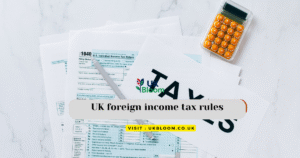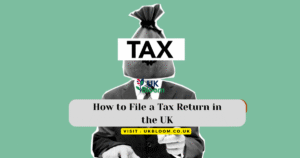At UKBloom, we understand that the UK tax system can feel overwhelming—especially when it involves less familiar topics like trust income. Many of our readers who move to the UK as skilled workers, students, or new residents ask us: How does Trust Income Tax Rules in the UK Works?
Whether you’re a trustee managing someone’s assets, a beneficiary receiving income from a trust, or someone planning your financial future in the UK, this guide breaks it all down simply.
Table of Contents
What is Trust Income Tax Rules in the UK?
A trust is a legal arrangement where one person (the settlor) gives assets to another (the trustee) to manage for the benefit of a third party (the beneficiary).
Trusts are used for many reasons:
- Protecting family wealth
- Providing for minors or vulnerable individuals
- Managing assets after death (via wills)
- Planning for inheritance tax
How Trust Income Is Taxed in the UK
Understanding trust taxation depends on the type of trust, the role you play (trustee or beneficiary), and the source of income (dividends, interest, rent, etc.).
Common Types of Trusts and Their Tax Treatment
1. Bare Trusts
- The beneficiary owns the assets outright.
- The beneficiary is personally responsible for declaring and paying tax on the income.
- Example: A parent sets up a bare trust for their child to manage savings.
2. Interest in Possession Trusts
- The beneficiary has the right to income generated by the trust.
- Trustees pay tax on the income and provide beneficiaries with a tax voucher so they can claim any tax back (if eligible).
- Tax rates depend on the income type:
- Dividends: 8.75%
- Other income (e.g. interest or rent): 20%
3. Discretionary Trusts
- Trustees decide how much income is distributed and to whom.
- Trustees pay tax at the trust rate:
- Dividends: 39.35%
- Other income: 45%
- Beneficiaries may reclaim some tax using form R40 if their tax liability is lower.
4. Settlor-Interested Trusts
- Set up by the settlor where they or their spouse/civil partner can benefit.
- Income is taxed as if it belongs to the settlor, not the trust.
- The settlor must report it via a Self Assessment tax return.
Tax Responsibilities: Trustees vs. Beneficiaries
Trustees:
- Must register the trust with HMRC (via the Trust Registration Service).
- File annual tax returns if the trust earns income or capital gains.
- Pay income tax on the trust’s behalf where applicable.
- Issue tax vouchers or R185 forms to beneficiaries.
Beneficiaries:
- May need to report trust income on their own tax return.
- Can reclaim overpaid tax if their personal rate is lower than the trust’s rate.
- Should keep all tax documents received from the trust.
How to Report Trust Income
Here’s a quick step-by-step for beneficiaries:
- Receive income and a tax certificate (form R185) from the trustee.
- Check your tax band (basic, higher, or additional rate).
- Complete your Self Assessment tax return online or via post.
- Reclaim overpaid tax (if applicable) using HMRC’s form R40.
Tip: If you’re new to the UK tax system, use the [UKBloom Income Tax Calculator] or our [Self-Assessment Guide] to see where you stand.
Key Tax Rates for Trusts (2025/26 Tax Year)
| Income Type | Bare Trust | Interest in Possession | Discretionary Trust | Settlor-Interested |
|---|---|---|---|---|
| Dividend Income | Personal rates | 8.75% | 39.35% | Settlor’s rate |
| Interest/Rent | Personal rates | 20% | 45% | Settlor’s rate |
(Source: gov.uk – Trusts and Income Tax
Real-World Example
Case: Anita recently moved to the UK and is the beneficiary of a discretionary trust set up by her grandfather.
- She receives £2,000 in trust income this year.
- The trustees have already paid 45% tax on it (£900).
- Since Anita’s personal income is below the basic rate band, she files form R40 to reclaim part of the tax.
This system ensures beneficiaries aren’t over-taxed if their income is within lower thresholds.
When Is Trust Registration Required?
Almost all UK express trusts must be registered with HMRC’s Trust Registration Service, even if there is no tax due.
Exceptions include:
- Charitable trusts
- Child bank accounts in bare trusts
- Trusts for life insurance pay-outs under £5,000
To check if your trust needs to be registered, visit gov.uk register a trust.
Common Mistakes to Avoid
- Not registering a trust when required
- Failing to report income from a trust on your tax return
- Missing deadlines for tax payments or form submissions
- Incorrectly calculating tax based on your role
We always recommend keeping detailed records and consulting a tax adviser if unsure.
Related UKBloom Resources
- Self-Assessment Tax Return Guide
- Income Tax Calculator Tool
- Moving to the UK: Financial Planning for Newcomers
FAQs About Trust Income Tax in the UK
What is form R185?
Form R185 is a tax voucher issued by trustees to beneficiaries. It shows how much income you received and what tax was paid on it.
Do I need to pay tax on income from a trust if I’m a student?
Yes, but you may be eligible to reclaim some or all of the tax if your income is below the personal allowance (£12,570 for 2024/25).
Can a non-UK resident be taxed on UK trust income?
Yes. If the income is generated in the UK, non-residents may still have to pay UK tax. Double-taxation treaties may apply, depending on your home country.
What happens if the trust doesn’t distribute income?
If it’s a discretionary trust, the trustees still pay tax on the income—even if it isn’t distributed.
Conclusion
Navigating trust income tax rules in the UK may seem complex, but understanding your role and the trust type makes it more manageable. Whether you’re receiving funds from abroad or acting as a trustee in the UK, staying compliant with HMRC’s rules is essential.
At UKBloom, we’re here to simplify financial life in the UK—from income tax to visas and more. If you’re ever in doubt, speak to a tax adviser or explore our [UK financial tools] designed to support you every step of the way.
Disclaimer
This article is for informational purposes only and does not constitute legal or immigration advice. Please refer to official UK government sources or seek legal support for specific guidance.






